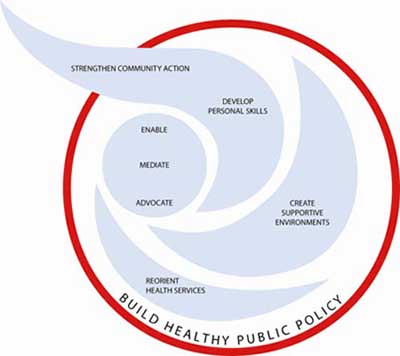The Ottawa Charter was developed in 1986 at the First International Conference on Health Promotion. The Charter recognised the many determinants of health and developed five (5) action areas to be used in health promotion to address these determinants. The five action areas are:
- Build Healthy Public Policy – policy development at all levels seeks to promote health. It includes: legislation, fiscal measures, taxation, and organizational change. Health, income and social policies are used to foster equity and ensures safer and healthier goods and services, healthier public services, and cleaner more enjoyable environments. Policies need to identify obstacles to health and seek to remove them, making the healthier choice the easiest one.
- Create Supportive Environments – there is a link between people’s health and their environment, requiring a socioecological approach to health. Reciprocal maintenance of environments is the guiding principle. Work and leisure should promote health, not demote it. Thus health promotion should create safe working environments that are enjoyable, assess health impacts of developing infrastructure (buildings, energy etc), and protect natural and built environments.
- Strengthen Community Actions – community action is strengthened through communities being involved in setting priorities, making decisions, planning strategies and implementing them to improve health outcomes. The process’ goal is to empower communities, which improves outcomes of health promotion.
- Develop Personal Skills – requires the provision of information, education and life skill development. This increases options and control for individuals over their own health. It is essential t equip people for life long learning and to develop skills for coping with ill health. This is done through school, home, and community settings.
- Reorient Health Services – health promotion is the responsibility of governments, institutions, professionals, community groups and individuals. Reorienting health services is about the shift towards a system which promotes health, rather than curative services. Health services need to support the needs of individuals and communities to promote health, connecting the health sector with social, political, economic and physical environments. This requires greater health research and professional education and training. The shift is to focus on the needs of the entire individual, not just their injury, illness or disease.
Argue the benefits of health promotion based on:
- the five action areas of the Ottawa Charter
Australia bases its health promotion on these five (5) action areas. The benefits of such an approach include:
- Better results of health promotion
- Health promotion that addresses all the determinants of health
- Greater empowerment of individuals and groups
- Health promotion that is based on the principles of social justice

